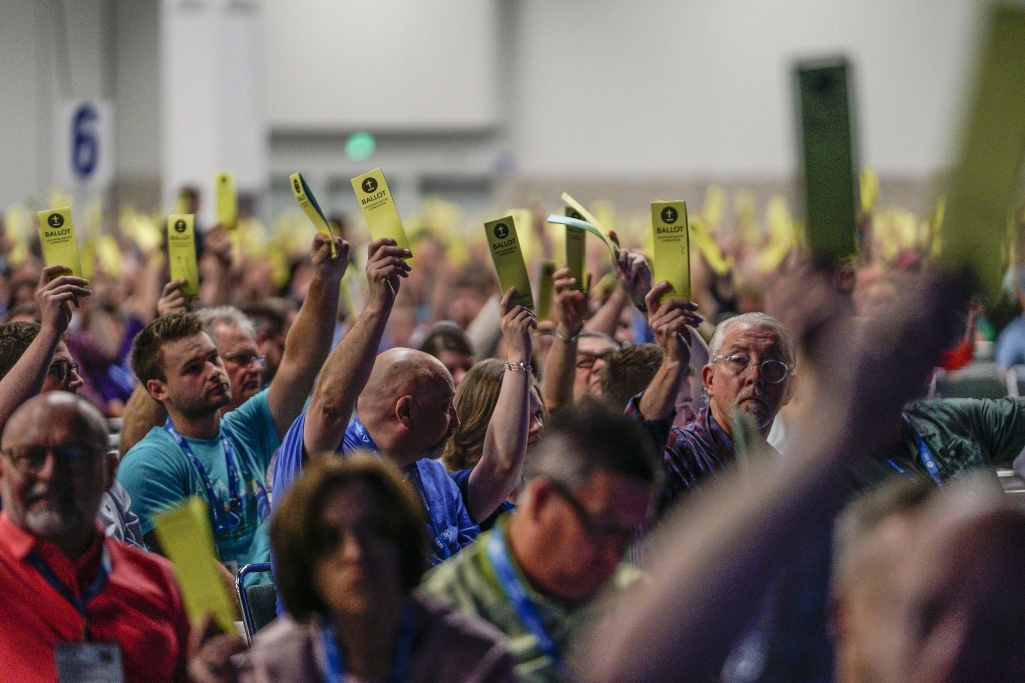
At our recent annual meeting in New Orleans, Southern Baptists took several actions clarifying our commitment to a complementarian view of gender roles in ministry.
First, messengers denied the appeal of two local churches that have been disfellowshipped in recent months for employing female pastors. Second, we voted to amend article 3, paragraph 1 of the SBC Constitution to state that a cooperating church “affirms, appoints, or employs only men as any kind of pastor or elder as qualified by Scripture.” Since this is a constitutional amendment, it will require a second two-thirds majority vote next year to be enacted.
Third, and perhaps most surprising, messengers amended Article VI of the Baptist Faith and Message 2000 to make clear that the two biblical offices are deacon and pastor/elder/overseer, with the latter office “limited to men as qualified by Scripture.” Many Southern Baptists are surprised we can amend our confession with a one-time vote from the floor, but that is another topic for another day.
Not surprisingly, egalitarians have expressed disappointment and even outrage at these decisions, especially on social media. We believe they doth protest too much. Historically, Southern Baptists have been committed to complementarianism. The egalitarianism advocated by moderates in the 1960s and 1970s proved a significant contributing factor to the Conservative Resurgence precisely because it was a departure from our historic consensus concerning what Scripture teaches about this matter.
When egalitarians have challenged our complementarianism consensus, the Convention has responded. In 1984, messengers adopted a resolution affirming the Bible’s teaching that only men can serve as pastors and that women should not be ordained. In 2000, we revised the Baptist Faith and Message to include a complementarian understanding of pastoral ministry. The actions messengers took in 2023 are consistent theologically with previous decisions over the past 40 years, as well as with the beliefs of a vast majority of Southern Baptists throughout our history. Those who are suddenly disappointed that most Southern Baptists don’t believe the Bible allows for women to serve as pastors are either misinformed about our beliefs or have some other agenda.
While we are thankful that the Convention remains committed to biblical complementarianism, we are concerned about the tone of our “family conversation” about women in ministry, especially in recent days. Specifically, we fear that Southern Baptists have at times loudly (though rightly) affirmed that only men should serve as pastors while only timidly affirming that God calls women to a variety of vocational ministries. We appreciate the resolution we adopted “On the Legacy and Responsibility of Women Fulfilling the Great Commission,” though we also regret that it has been largely ignored in the larger narrative coming out of New Orleans.
We know we are not alone in our concern. Both of us have spoken with numerous Southern Baptist women who are discouraged because they feel like the Convention has shouted that women should not serve as pastors while only whispering that God calls women to serve in other ministry leadership roles. All these women are complementarians. Yet, they are frustrated, hesitant and hurt. Many are unwilling to speak up, lest they be wrongly accused of being egalitarians who desire to serve as pastors.
We are grieved that there are complementarian women, serving in ministry leadership roles, who feel uncertain about their future in Southern Baptist life. As the Baptist Faith and Message 2000 says, “both men and women are gifted for service in the church.” While this statement is certainly broad enough to include both volunteer and vocational ministry service, we want to focus our comments on the latter, since vocational ministry is at the heart of our current discussions.
Southern Baptist churches are filled with complementarian women who serve in staff leadership roles. They minister to children and youth. They disciple other women. They mobilize believers for mission in their neighborhoods and among the nations. They connect visitors and new members with discipleship opportunities. They offer counsel to those who are struggling. They lead congregations in musical worship. The list could go on. Some of these sisters have the word “minister” in their job title, while others are “directors” or “coordinators.” They are not pastors/elders/overseers, but their ministries advance the kingdom.
Beyond the local church, Southern Baptist women minister vocationally in countless ways. They serve as missionaries, including with our two mission boards. They serve as professors who teach students in our colleges and seminaries. They have important leadership roles in all our state conventions and many local associations. They write books and curricula for Lifeway Christian Resources and produce helpful resources for the Ethics & Religious Liberty Commission. These are just some of the ways complementarian women serve in fulltime Christian ministry just within our Convention. Their strategic ministries advance the kingdom.
As Southern Baptists continue to reaffirm our commitment to biblical complementarianism, we must also be crystal clear that God calls and gifts women to vocational ministry. Right now, He is calling countless women in our churches to kingdom service. Thousands of Southern Baptist women are currently studying at our colleges and seminaries so that they can be better equipped to obey God’s call upon their lives. We should affirm their godly callings joyfully and unequivocally, without clearing out throats or apologizing for the equally biblical principle of the priesthood of all believers. Our sisters’ ministries advance the kingdom.
Our prayerful desire is that Southern Baptists will spend at least as much time celebrating the various ministries of godly women as we do defending the biblical truth that only qualified men should serve as pastors/elders/overseers. God commands all Christian women to obey the Great Commission, sometimes by calling them to serve in vocational ministry leadership roles. Their ministries advance the kingdom – for the glory of God, the health of His churches, and the sake of the world that He so loves.
(EDITOR’S NOTE – Nathan Finn is SBC recording Secretary and provost of North Greenville University in Tigerville, S.C. Leah Finn was chair of the 2022 SBC Committee on Nominations.)


